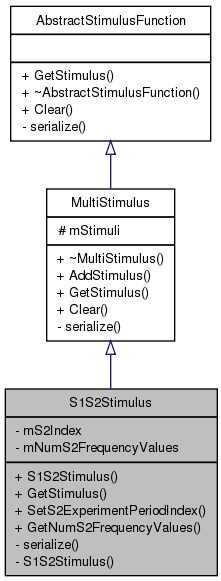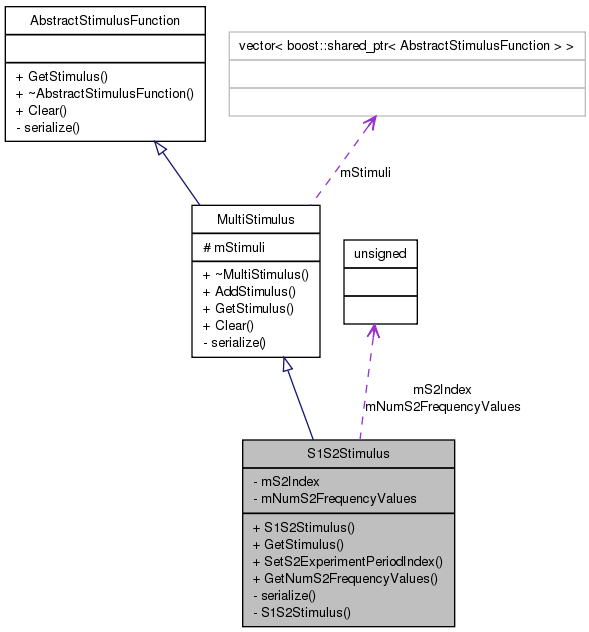#include <S1S2Stimulus.hpp>
 Inheritance diagram for S1S2Stimulus:
Inheritance diagram for S1S2Stimulus: Collaboration diagram for S1S2Stimulus:
Collaboration diagram for S1S2Stimulus:Public Member Functions | |
| S1S2Stimulus (double magnitude, double stimulusDuration, double s1Duration, double s1Period, double startTime, std::vector< double > s2Periods) | |
| double | GetStimulus (double time) |
| void | SetS2ExperimentPeriodIndex (unsigned index) |
| unsigned | GetNumS2FrequencyValues () |
Private Member Functions | |
| template<class Archive > | |
| void | serialize (Archive &archive, const unsigned int version) |
| S1S2Stimulus () | |
Private Attributes | |
| unsigned | mS2Index |
| unsigned | mNumS2FrequencyValues |
Friends | |
| class | boost::serialization::access |
Detailed Description
This class provides a stimulus function which follows an S1-S2 protocol. i.e.
Run a RegularStimulus at a certain (S1) frequency Then run two pulses of a second RegularStimulus at another (S2) frequency. These are combined into a MultiStimulus.
We have a number of these MultiStimulus objects, created for a given vector s2Periods in the constructor. As a user you set which of these S2 frequencies to run with the method SetS2ExperimentPeriodIndex().
Definition at line 60 of file S1S2Stimulus.hpp.
Constructor & Destructor Documentation
| S1S2Stimulus::S1S2Stimulus | ( | ) | [inline, private] |
Private constructor - for archiving's eyes only.
Definition at line 92 of file S1S2Stimulus.hpp.
| S1S2Stimulus::S1S2Stimulus | ( | double | magnitude, |
| double | stimulusDuration, | ||
| double | s1Duration, | ||
| double | s1Period, | ||
| double | startTime, | ||
| std::vector< double > | s2Periods | ||
| ) |
Constructor
- Parameters:
-
magnitude The magnitude of the stimulus 'square wave'. stimulusDuration The duration of the stimulus 'square wave'. s1Duration The duration of the S1 phase of the experiment, should be a multiple of the s1Period. s1Period The period of the S1 phase (typically ~1000ms for example). startTime The time at which to begin the S1 stimulus (this delay is automatically added to give smooth transition to S2). s2Periods A std::vector of the different S2 frequencies that should be run (for example {1000, 900, 800} (ms)).
Definition at line 37 of file S1S2Stimulus.cpp.
References MultiStimulus::AddStimulus(), mNumS2FrequencyValues, and mS2Index.
Member Function Documentation
| unsigned S1S2Stimulus::GetNumS2FrequencyValues | ( | ) |
- Returns:
- The number of different frequencies this stimulus can perform.
Definition at line 75 of file S1S2Stimulus.cpp.
References mNumS2FrequencyValues.
Get the magnitude of the multiple stimuli at time 'time'
- Parameters:
-
time time at which to return the stimulus
- Returns:
- Magnitude of stimulus at time 'time'.
Reimplemented from MultiStimulus.
Definition at line 58 of file S1S2Stimulus.cpp.
References mS2Index, and MultiStimulus::mStimuli.
| void S1S2Stimulus::serialize | ( | Archive & | archive, |
| const unsigned int | version | ||
| ) | [inline, private] |
Archive the simple stimulus, never used directly - boost uses this.
- Parameters:
-
archive version
Reimplemented from MultiStimulus.
Definition at line 72 of file S1S2Stimulus.hpp.
References mNumS2FrequencyValues, and mS2Index.
| void S1S2Stimulus::SetS2ExperimentPeriodIndex | ( | unsigned | index | ) |
Allows us to move to the 'next' S2 frequency.
- Parameters:
-
index Which S2 frequency to use next.
Definition at line 63 of file S1S2Stimulus.cpp.
References EXCEPTION, mNumS2FrequencyValues, and mS2Index.
Friends And Related Function Documentation
friend class boost::serialization::access [friend] |
Needed for serialization.
Reimplemented from MultiStimulus.
Definition at line 64 of file S1S2Stimulus.hpp.
Member Data Documentation
unsigned S1S2Stimulus::mNumS2FrequencyValues [private] |
The Number of S2 Frequencies that have been set up
Definition at line 87 of file S1S2Stimulus.hpp.
Referenced by GetNumS2FrequencyValues(), S1S2Stimulus(), serialize(), and SetS2ExperimentPeriodIndex().
unsigned S1S2Stimulus::mS2Index [private] |
The Index of the S2 Frequency that we wish to run (as specified in the vector in the constructor).
Definition at line 83 of file S1S2Stimulus.hpp.
Referenced by GetStimulus(), S1S2Stimulus(), serialize(), and SetS2ExperimentPeriodIndex().
The documentation for this class was generated from the following files:
- heart/src/stimulus/S1S2Stimulus.hpp
- heart/src/stimulus/S1S2Stimulus.cpp


